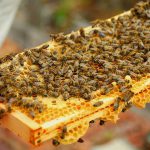
On Friday, the Afrikaans agricultural magazine, Landbouweekblad, carried the article “Hoe moet boere vir droogte aanpas, minister?” [How should farmers adapt to drought, minister?] The piece was written in response to the national government’s lack of interest to assist the country’s commercial farmers in the face of the worst drought in over three decades.
Various permissions are required to use the water on one’s own farm, be it to irrigate or to build a dam, an accepted intervention to hold back water for a time of need. At the time of the National Water Act of 1998, it was envisaged that managing agencies in nine catchment areas would be set up to process applications for licenses. In 2015, only two are in place. And it takes years after making an application to receive a water license! One appreciates the indignation caused by the casual ministerial comment and how keenly farmers feel the effrontery of it all.
Apart from the standard risks any person faces when what is important is in the hands of bureaucracy — intransigence and incompetence — the commercial farming community faces an additional hurdle, the ambivalence with which it is viewed by government. On the one hand, it is an ideal job creator, earner of foreign exchange and the reason for the country’s food secure status. On the other hand, the continued skewed land ownership ratio is a blot on the government’s performance sheet. Reasons vary and we won’t go into them here; suffice it to say that none of this helps the country much.
Also in the news on Friday (carried by news sources beyond these shores, like the Guardian and BBC), an ultimatum issued by President Obama to the South African government: resolve outstanding issues blocking agricultural imports from the USA or have your duty-free farm trade status with the USA suspended. This is part of AGOA (African Growth and Opportunity Act), a measure first implemented under the Clinton administration to encourage economic growth in Africa.
The Department of Trade & Industry duly calmed the waters, giving assurances that it is on track to meet all eligibility criteria to remain a beneficiary of AGOA for the next 10 years. South Africa has been given six weeks. While it is true that there have been biosecurity reservations to muddy the process (bird flu in two major US poultry-producing states), and while there is indeed a major balancing act to ensure that the country’s home industry is not unfairly disadvantaged, we hope that the matter is in better hands than the ones dispensing with water licenses.



Share this article







